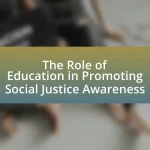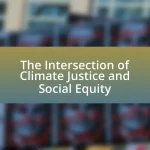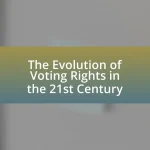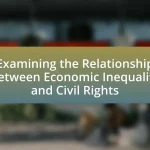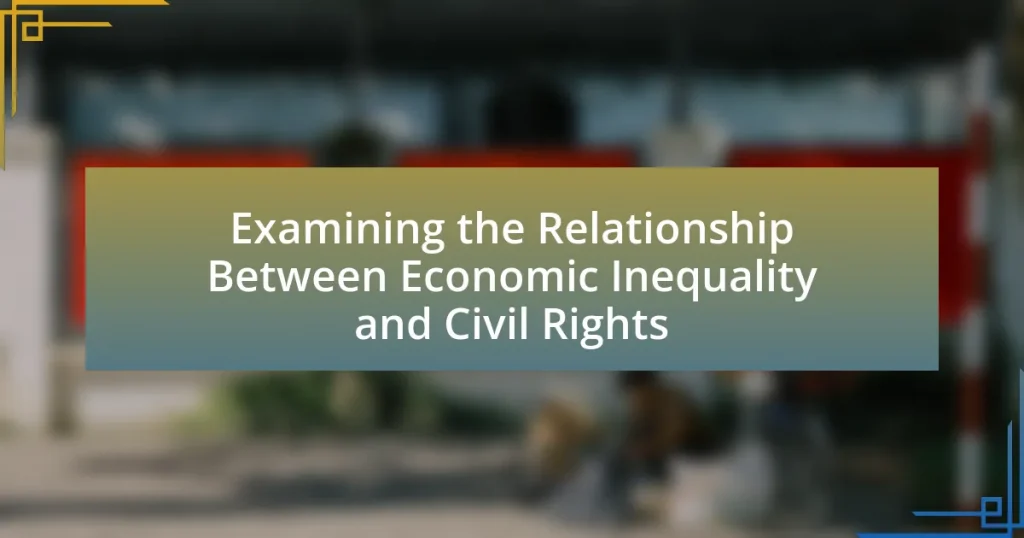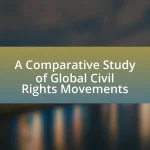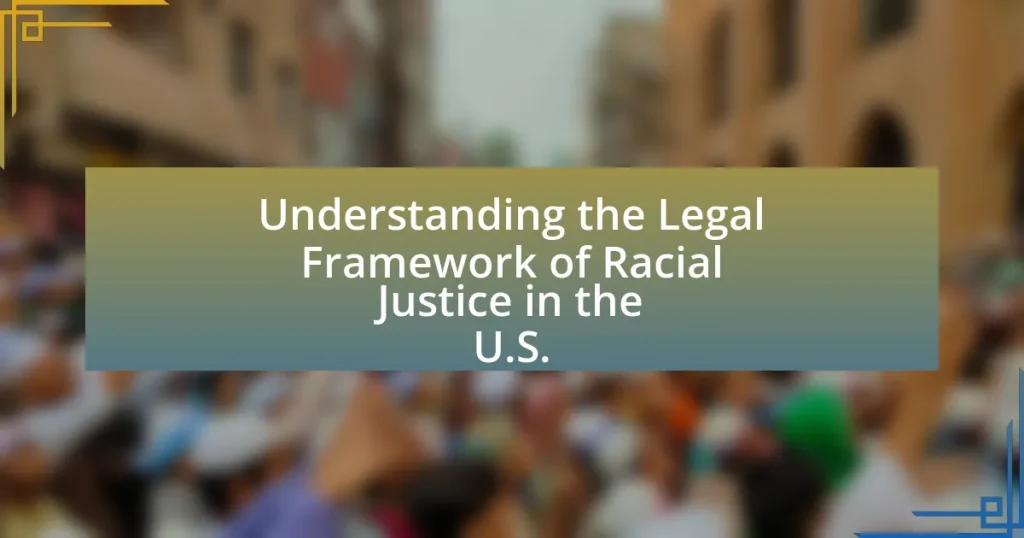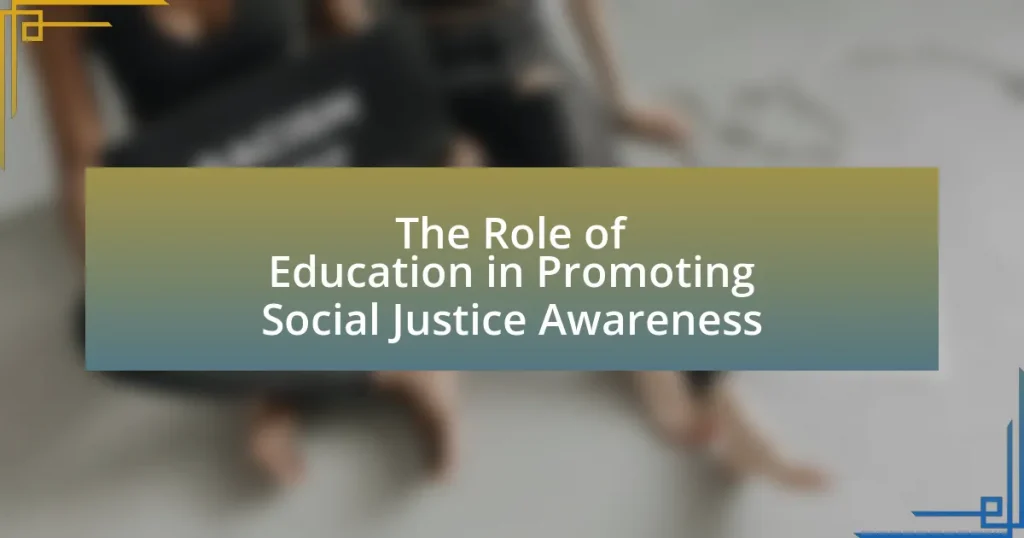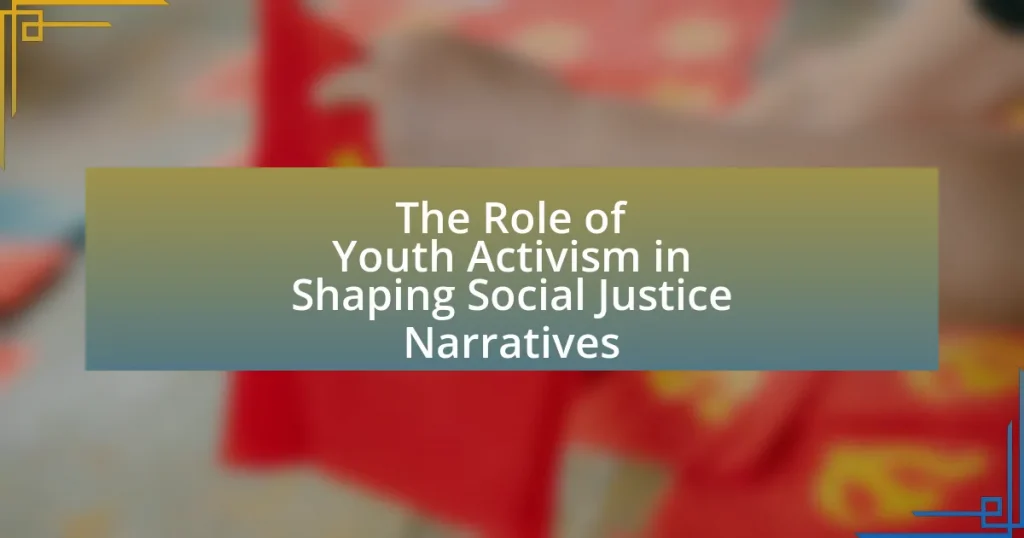The article examines the relationship between economic inequality and civil rights, highlighting how disparities in wealth impact access to resources, political power, and social justice. It discusses the systemic barriers faced by marginalized groups, which limit their ability to exercise civil rights, and explores historical contexts, such as the Civil Rights Movement, that illustrate the connection between economic status and civil rights. The article also analyzes how different societies experience this intersection, the implications of economic inequality on civil rights, and the role of policies and grassroots movements in addressing these issues. Key factors influencing this relationship include systemic discrimination, access to education, and labor market disparities, all of which contribute to the ongoing struggle for social equity.
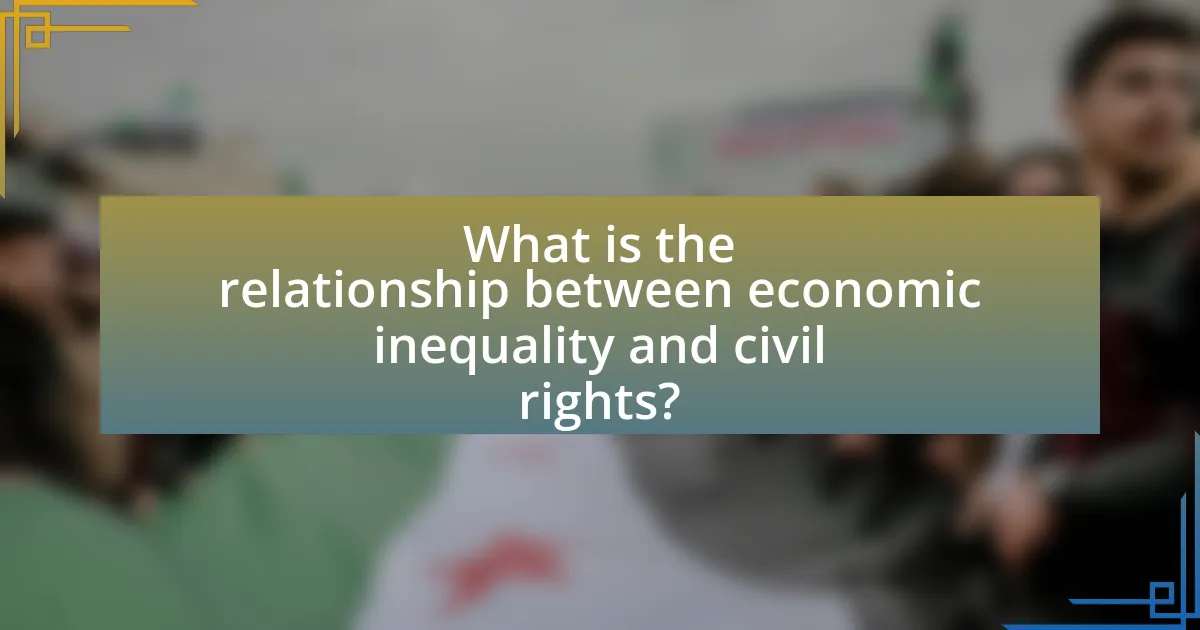
What is the relationship between economic inequality and civil rights?
Economic inequality negatively impacts civil rights by creating disparities in access to resources, political power, and social justice. When wealth is concentrated in the hands of a few, marginalized groups often face systemic barriers that limit their ability to exercise their civil rights, such as voting, education, and fair employment. For instance, research from the Economic Policy Institute indicates that income inequality has been linked to reduced political participation among lower-income individuals, which undermines their civil rights. Additionally, historical contexts, such as the Civil Rights Movement in the United States, demonstrate that economic disparities often correlate with racial and social injustices, highlighting the intertwined nature of economic status and civil rights.
How do economic inequality and civil rights intersect?
Economic inequality and civil rights intersect primarily through the impact of wealth disparities on access to opportunities and resources, which can perpetuate systemic discrimination. For instance, marginalized communities often face barriers to quality education, healthcare, and employment due to economic disadvantages, which in turn limits their ability to exercise civil rights effectively. Research indicates that areas with higher economic inequality tend to have lower levels of civic engagement and political participation among disadvantaged groups, as seen in studies by the Economic Policy Institute, which highlight how income inequality correlates with reduced access to political power and representation. This relationship underscores the importance of addressing economic disparities to enhance civil rights and promote social equity.
What historical contexts have shaped this relationship?
The relationship between economic inequality and civil rights has been shaped by several historical contexts, including the legacy of slavery, the Civil Rights Movement, and economic policies that have disproportionately affected marginalized communities. The legacy of slavery established systemic racial disparities in wealth and opportunity, which persisted through Jim Crow laws that enforced segregation and economic disenfranchisement. The Civil Rights Movement of the 1960s aimed to dismantle these barriers, highlighting the connection between economic justice and civil rights, as activists argued that true equality could not be achieved without addressing economic disparities. Additionally, policies such as redlining and discriminatory lending practices have perpetuated economic inequality, further entrenching the relationship between economic status and civil rights. These historical contexts illustrate how economic inequality has been both a cause and a consequence of civil rights struggles in the United States.
How do different societies experience this intersection?
Different societies experience the intersection of economic inequality and civil rights in varied ways, influenced by their historical, cultural, and political contexts. For instance, in the United States, systemic economic disparities often correlate with racial discrimination, leading to significant civil rights movements aimed at addressing both economic and social injustices. In contrast, Scandinavian countries, characterized by strong social welfare systems, tend to experience lower levels of economic inequality, which correlates with higher civil rights protections and less social unrest. Research by the OECD indicates that countries with lower income inequality tend to have stronger civil rights frameworks, as seen in nations like Norway and Sweden, where policies promote both economic equity and social justice.
Why is understanding this relationship important?
Understanding the relationship between economic inequality and civil rights is important because it reveals how disparities in wealth can lead to systemic discrimination and hinder social justice. Research indicates that high levels of economic inequality correlate with reduced access to civil rights protections, as marginalized groups often lack the resources to advocate for their rights effectively. For instance, a study by the Economic Policy Institute found that income inequality can exacerbate racial and ethnic disparities in education, employment, and housing, ultimately undermining civil rights advancements. This understanding is crucial for policymakers aiming to create equitable systems that promote both economic opportunity and civil liberties.
What implications does economic inequality have on civil rights?
Economic inequality significantly undermines civil rights by creating disparities in access to resources, political power, and social justice. When wealth is concentrated in the hands of a few, marginalized groups often face systemic barriers that limit their ability to exercise their rights. For instance, studies show that communities with higher economic inequality experience lower voter turnout and reduced political representation, as wealthier individuals can exert more influence over political processes. Additionally, economic disparities correlate with unequal access to quality education and healthcare, which further perpetuates cycles of poverty and disenfranchisement. The 2018 report by the Institute for Policy Studies highlights that the wealthiest 1% in the U.S. hold more wealth than the bottom 90%, illustrating how economic inequality can lead to a diminished capacity for marginalized groups to advocate for their civil rights effectively.
How can civil rights movements address economic inequality?
Civil rights movements can address economic inequality by advocating for policies that promote equal access to economic opportunities and resources. These movements historically have pushed for legislation such as the Civil Rights Act of 1964, which aimed to eliminate discrimination in employment and education, thereby fostering a more equitable economic landscape. Additionally, civil rights organizations often engage in grassroots mobilization to raise awareness about economic disparities and lobby for reforms like minimum wage increases and affordable housing initiatives. For instance, the Fight for $15 campaign has highlighted the struggles of low-wage workers, demonstrating how civil rights activism can directly influence economic policy to reduce inequality.
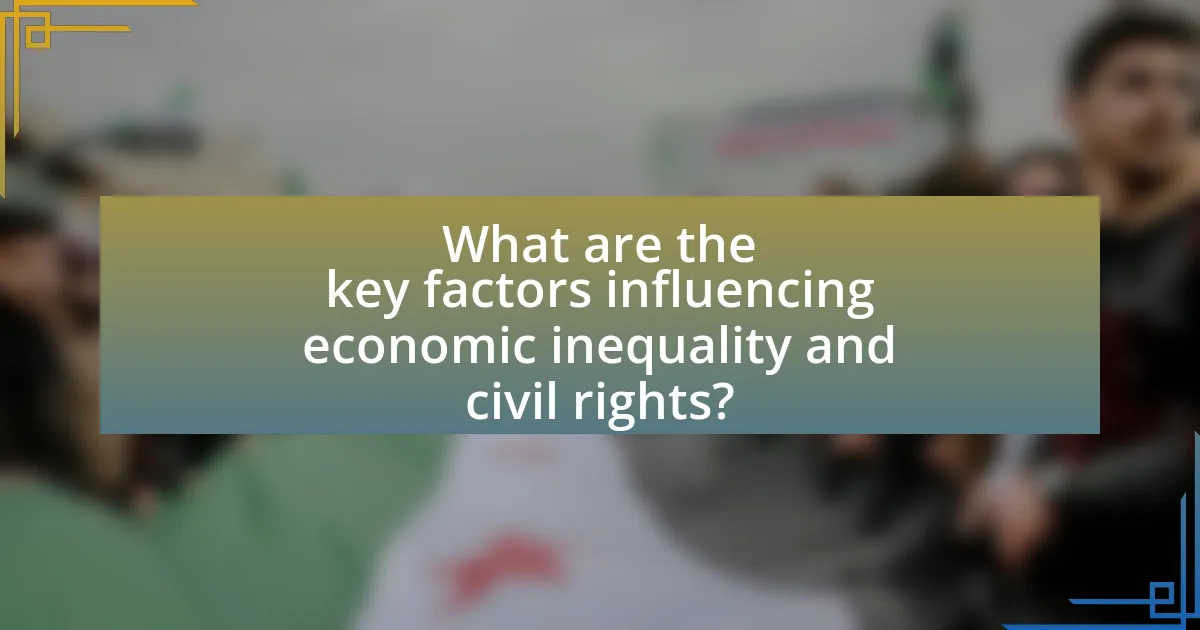
What are the key factors influencing economic inequality and civil rights?
Key factors influencing economic inequality and civil rights include systemic discrimination, access to education, and labor market disparities. Systemic discrimination, such as racial and gender biases, limits opportunities for marginalized groups, contributing to economic disparities. Access to quality education is crucial; studies show that individuals with higher education levels tend to earn significantly more, thereby reducing inequality. Labor market disparities, including wage gaps and employment opportunities, further exacerbate economic inequality, as evidenced by the fact that women and minorities often earn less than their white male counterparts for similar work. These factors collectively shape the landscape of economic inequality and civil rights, highlighting the interconnectedness of these issues.
How does systemic discrimination contribute to economic inequality?
Systemic discrimination contributes to economic inequality by creating barriers that limit access to resources, opportunities, and fair treatment in various sectors such as employment, education, and housing. For instance, studies show that racial and ethnic minorities often face hiring biases, resulting in lower employment rates and wages compared to their white counterparts. According to the Economic Policy Institute, Black workers earn approximately 73% of what white workers earn, highlighting the wage gap exacerbated by systemic discrimination. Additionally, discriminatory practices in education, such as underfunding schools in predominantly minority neighborhoods, lead to disparities in educational attainment, which further perpetuates economic inequality.
What role do policies play in perpetuating inequality?
Policies play a critical role in perpetuating inequality by establishing frameworks that favor certain groups over others, often through systemic discrimination. For instance, policies related to housing, education, and employment can create barriers for marginalized communities, limiting their access to resources and opportunities. Historical examples include redlining practices in the United States, which denied mortgage loans to residents in predominantly Black neighborhoods, thereby restricting wealth accumulation and perpetuating economic disparities. Additionally, tax policies that disproportionately benefit the wealthy further entrench inequality by allowing the rich to accumulate more wealth while providing minimal support for lower-income individuals. These policy decisions create a cycle of disadvantage that is difficult to break, reinforcing existing social and economic hierarchies.
How do social structures impact civil rights?
Social structures significantly impact civil rights by shaping the distribution of power, resources, and opportunities within a society. For instance, systemic inequalities in wealth and education can lead to marginalized groups facing barriers in accessing legal protections and political representation. Historical evidence shows that during the Jim Crow era in the United States, social structures enforced racial segregation and discrimination, severely limiting the civil rights of African Americans. Additionally, contemporary studies indicate that economic disparities correlate with lower voter turnout and reduced civic engagement among disadvantaged populations, further entrenching civil rights violations.
What economic factors exacerbate civil rights issues?
Economic factors that exacerbate civil rights issues include income inequality, unemployment rates, and access to education. Income inequality creates disparities in wealth distribution, leading to marginalized communities facing systemic barriers in accessing resources and opportunities. High unemployment rates disproportionately affect minority groups, limiting their economic mobility and reinforcing social inequities. Additionally, lack of access to quality education perpetuates cycles of poverty, hindering individuals from achieving upward mobility and fully participating in society. According to the Economic Policy Institute, racial wage gaps persist, with Black workers earning significantly less than their white counterparts, illustrating how economic disparities directly impact civil rights.
How does access to education affect economic opportunities?
Access to education significantly enhances economic opportunities by equipping individuals with the skills and knowledge necessary for higher-paying jobs. Studies show that individuals with a college degree earn, on average, 65% more than those with only a high school diploma over their lifetime. Furthermore, access to quality education reduces unemployment rates; for instance, the U.S. Bureau of Labor Statistics reported that in 2021, the unemployment rate for individuals with a bachelor’s degree was 2.2%, compared to 8.3% for those without a high school diploma. This correlation illustrates that education serves as a critical pathway to economic advancement, enabling individuals to secure better employment and contribute to economic growth.
What is the impact of employment discrimination on civil rights?
Employment discrimination significantly undermines civil rights by perpetuating economic inequality and limiting access to opportunities for marginalized groups. This form of discrimination restricts individuals’ ability to secure employment based on race, gender, age, or disability, which in turn affects their economic stability and social mobility. According to the U.S. Equal Employment Opportunity Commission, in 2020, there were over 67,000 charges of employment discrimination filed, highlighting the prevalence of this issue. Such discrimination not only violates the principles of equality and fairness enshrined in civil rights laws but also contributes to systemic disparities in income and wealth, further entrenching social inequities.
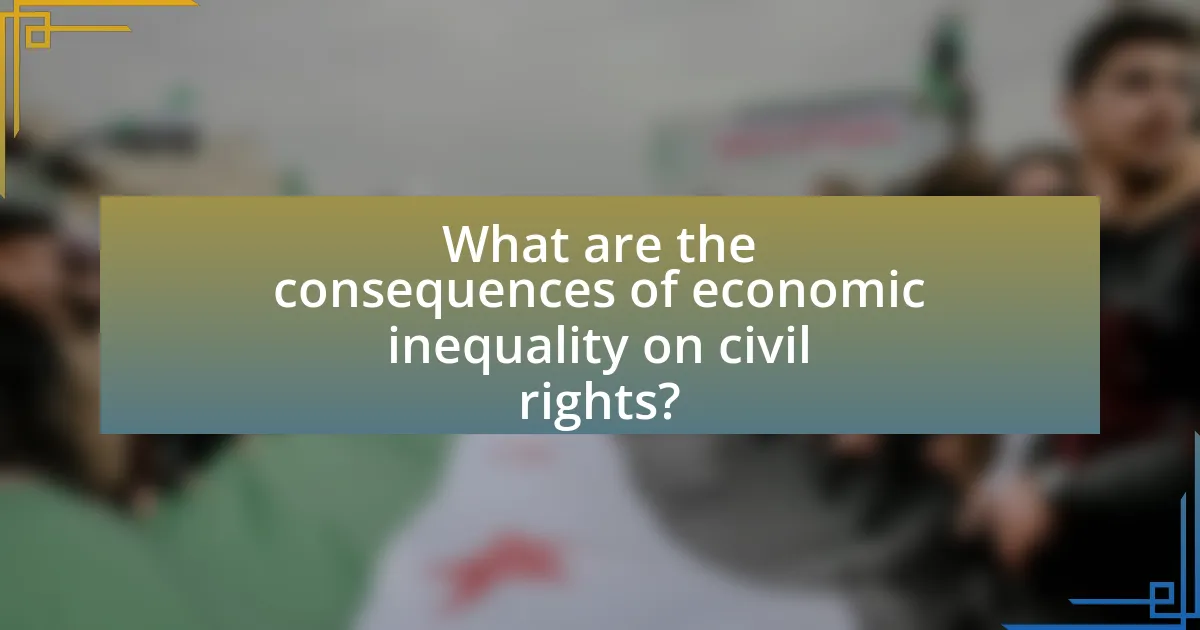
What are the consequences of economic inequality on civil rights?
Economic inequality significantly undermines civil rights by creating disparities in access to resources, political power, and social justice. Individuals from lower economic backgrounds often face systemic barriers that limit their ability to participate fully in democratic processes, such as voting and advocacy. For instance, studies show that wealthier individuals are more likely to influence political decisions through campaign contributions and lobbying, thereby skewing policies in their favor and marginalizing the voices of economically disadvantaged groups. Additionally, economic inequality correlates with higher rates of discrimination and reduced access to quality education and healthcare, which further exacerbates social inequities and limits the realization of civil rights for affected populations.
How does economic inequality affect marginalized communities?
Economic inequality adversely affects marginalized communities by limiting their access to essential resources such as education, healthcare, and employment opportunities. This lack of access perpetuates cycles of poverty and disenfranchisement, as evidenced by data showing that individuals in low-income neighborhoods often attend underfunded schools, leading to lower educational attainment. According to the Economic Policy Institute, children from low-income families are less likely to graduate from high school, which significantly reduces their chances of securing stable, well-paying jobs. Furthermore, marginalized communities frequently experience disparities in healthcare access, resulting in poorer health outcomes and increased medical costs, which further entrenches economic inequality. The systemic barriers faced by these communities highlight the direct correlation between economic inequality and the erosion of civil rights, as limited economic resources restrict their ability to advocate for equitable treatment and representation.
What are the social consequences of economic disparities?
Economic disparities lead to significant social consequences, including increased crime rates, reduced social mobility, and heightened social tensions. Research indicates that areas with high economic inequality often experience higher levels of violence and crime, as individuals may resort to illegal activities out of desperation or frustration. For instance, a study by the National Institute of Justice found that neighborhoods with greater income inequality had a 20% higher rate of violent crime compared to more equitable areas.
Additionally, economic disparities hinder social mobility, as individuals from lower-income backgrounds face barriers to education and employment opportunities. According to the Pew Research Center, children from low-income families are less likely to achieve upward mobility, perpetuating a cycle of poverty.
Moreover, economic inequality fosters social tensions and divisions, leading to increased polarization within communities. A report from the Brookings Institution highlights that communities with significant economic divides often experience greater social unrest and conflict, as marginalized groups feel disenfranchised and excluded from societal benefits.
These social consequences illustrate the profound impact that economic disparities have on societal cohesion and individual well-being.
How does economic inequality influence political representation?
Economic inequality significantly influences political representation by creating disparities in political power and access to decision-making processes. Wealthier individuals and groups often have greater resources to influence political outcomes through campaign contributions, lobbying, and access to policymakers, which can lead to policies that favor their interests over those of lower-income populations. For instance, research by Gilens and Page (2014) in “Testing Theories of American Politics: Elites, Interest Groups, and Average Citizens” demonstrates that economic elites have a disproportionate impact on policy outcomes compared to average citizens, indicating that economic inequality skews political representation. This dynamic can result in a political landscape where the voices of economically disadvantaged groups are marginalized, further entrenching inequality and limiting their influence in governance.
What strategies can be employed to address these issues?
To address the issues of economic inequality and civil rights, implementing comprehensive policy reforms is essential. These reforms should include increasing access to quality education and healthcare, which are critical for leveling the playing field. For instance, studies show that equitable education funding can significantly reduce achievement gaps, thereby enhancing economic mobility for marginalized communities. Additionally, enforcing anti-discrimination laws in employment and housing can help ensure that all individuals have equal opportunities, regardless of their economic background. Research indicates that regions with strong civil rights protections experience lower levels of economic inequality, highlighting the importance of these strategies in fostering a more equitable society.
How can policy reforms promote equality in civil rights?
Policy reforms can promote equality in civil rights by implementing laws that address systemic discrimination and ensure equal access to resources and opportunities. For instance, the Civil Rights Act of 1964 in the United States outlawed discrimination based on race, color, religion, sex, or national origin, which significantly advanced civil rights by providing legal frameworks for individuals to challenge discriminatory practices. Additionally, reforms such as affirmative action policies have aimed to rectify historical injustices by promoting diversity in education and employment, thereby fostering a more equitable society. These reforms are supported by data indicating that regions with stronger civil rights protections experience lower levels of economic inequality, demonstrating a direct correlation between policy initiatives and the enhancement of civil rights.
What role do grassroots movements play in combating inequality?
Grassroots movements play a crucial role in combating inequality by mobilizing communities to advocate for social and economic justice. These movements empower marginalized groups, raise awareness about systemic injustices, and influence policy changes through collective action. For instance, the Civil Rights Movement in the United States, which included grassroots organizations like the Student Nonviolent Coordinating Committee, successfully challenged racial segregation and discrimination, leading to landmark legislation such as the Civil Rights Act of 1964. Additionally, contemporary movements like Black Lives Matter have highlighted issues of racial inequality and police violence, fostering public discourse and legislative reforms aimed at addressing these disparities. Such movements demonstrate the effectiveness of grassroots organizing in driving societal change and promoting equity.
What are the best practices for advocating civil rights in the context of economic inequality?
The best practices for advocating civil rights in the context of economic inequality include grassroots organizing, coalition building, and policy advocacy. Grassroots organizing empowers marginalized communities by mobilizing them to demand their rights and address economic disparities directly. Coalition building fosters collaboration among diverse groups, enhancing the collective voice and impact of civil rights initiatives. Policy advocacy focuses on influencing legislation and regulations that address economic inequality, such as advocating for living wages, affordable housing, and equitable access to education. Research shows that movements combining these strategies, like the Fight for $15 campaign, have successfully raised minimum wage standards in various states, demonstrating the effectiveness of these practices in promoting civil rights amidst economic inequality.

